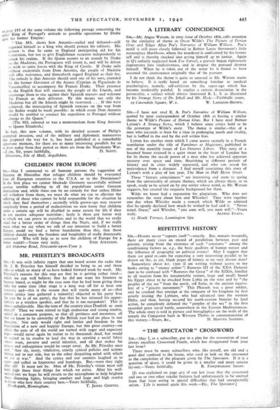Sot,—I have not read E A. Poe's Narrative of William
Willson, quoted by your correspondent of October 18th as having a similar theme to Wilde's Picture of Dorian Gray. But I have read Bulwer Lytton's A Strange Story, which I believe some critics hold to be the prototype of Wilde's story. The theme is similar—that of a man who succeeds at least for a time in prolonging youth and vitality, but is baffled in the end by the evil within him.
Lytton has another story which I came across recently in a French translation under the title of Fantomes et Magiciens, published in one of the monthly issues of Les Oeuvres Libres. This story of a haunted house situated in a quiet street in the heart of London has for its theme the occult .power of a man who has achieved apparent mastery over space and time, flourishing at different periods of history and in cities widely separated, and who can wreak his malevolence from a distance. I find myself associating this story of Lytton's with a play of last year, The Man in Half Moon Street.
These " literary coincidences " are interesting and seem to spring from the universality of certain themes, which are always there, so to speak, ready to be seized on by any writer whose mind, as Mr. Watson suggests, has created the requisite background for them.
Wilde we know had a reputation for plagiarism. Who does not remember the story about him and Whistler? They were together one day when Whistler made a remark which Wilde so admired that he openly declared how much he wished he had said it. " Never mind, Oscar," said Whistler, " you soon will, you soon will."—Yours
truly, ALFRED EVANS.
13 Heath Terrace, Leamington Spa.






































 Previous page
Previous page